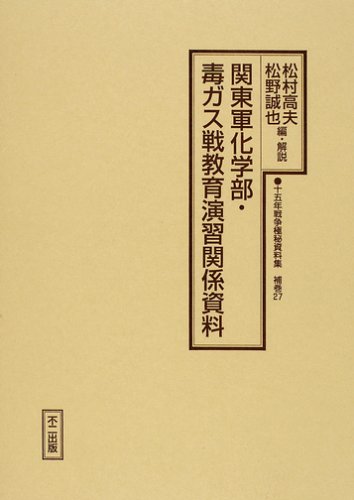202 0 0 0 旧日本軍による細菌兵器攻撃の事実 : 新発見史料「金子順一論文」は731部隊による細菌戦の何を明らかにしたのか (特集 戦後67年の夏に想う : 平和、民主主義、人権そして3.11以降)
- 著者
- 松村 高夫
- 出版者
- 全国保険医団体連合会
- 雑誌
- 月刊保団連 (ISSN:02885093)
- 巻号頁・発行日
- no.1102, pp.10-15, 2012-08
37 0 0 0 IR 『ヒル・レポート』(上) : 731部隊の人体実験に関するアメリカ側調査報告(1947年)
- 著者
- 松村 高夫 金平 茂紀
- 出版者
- 慶應義塾経済学会
- 雑誌
- 三田学会雑誌 (ISSN:00266760)
- 巻号頁・発行日
- vol.84, no.2, pp.508(286)-526(304), 1991-07
資料
33 0 0 0 IR 731部隊による細菌戦と戦時・戦後医学
- 著者
- 松村 高夫
- 出版者
- 慶應義塾経済学会
- 雑誌
- 三田学会雑誌 (ISSN:00266760)
- 巻号頁・発行日
- vol.106, no.1, pp.31-68, 2013-04
小特集 : 澤瀉久敬『医学概論』とその歴史的コンテクスト731部隊に所属した医者・高橋正彦と金子順一が戦後それぞれ慶應大学, 東京大学に提出した医学博士論文を基礎にして, 同部隊のペスト班責任者・高橋のもとで人体実験を行なって研究・開発されたペスト感染蚤が, 実際に1940-42年に中国十数地域で散布され, 多数の死者を出した実態を明らかにし, さらに戦後, 731部隊・細菌戦に関連する資料が部隊幹部・医者の戦犯免責と引き換えにアメリカに提供され, 高橋らが詳細な英文の報告書作成に協力した事実を明らかにする。そして, 戦後日本の大学医学部が731部隊関係者に医学博士号を授与したことに象徴されるように, 日本の医学界が731部隊への医者の関わりについて何ら自己批判せずに今日まできているその在りかたを問う。Based on the doctoral dissertation in medicine submitted to Keio University by Masahiko Takahashi and the University of Tokyo by Jun-ichi Kaneko, respectively (both former medical doctors of Unit 731), this study confirms the facts surrounding the development and research of plague infected fleas performed through human experimentation under the responsibility of Takahashi, the person in charge of the plague squad, and the actual scattering of the plague infected fleas (PX) in more than ten regions in China during the 1940–1942 period, resulting in a large number of deaths.In addition, this study confirms the cooperation by Takahashi in the preparation of a detailed report in English provided to the U.S. after the war of material related to germ welfare and Unit 731, in exchange for war trials immunity to Unit officers and doctors.Moreover, this study questions the very fact that the Japanese medical community can remain free from self-criticism up to now regarding the involvement of doctors with Unit 731 symbolized by the department of medicine at universities in post-war Japan that awarded doctor's degree in medicine to those involved in Unit 731.
23 0 0 0 IR 「新京・農安ペスト流行」(1940年)と731部隊(上)
- 著者
- 松村 高夫
- 出版者
- 慶應義塾経済学会
- 雑誌
- 三田学会雑誌 (ISSN:00266760)
- 巻号頁・発行日
- vol.95, no.4, pp.647(13)-668(34), 2003-01
論説はじめにI 農安・新京ペスト流行の経緯II 731部隊の出動III 731部隊の獲得したものIV 新京・農安ペストのデータの行方「満州国」の首都・新京(現、長春)とその郊外の農安で1940年に発生したベストの防疫を揚げて、731部隊がハルビン郊外の平房から両地域に出動したが、731部隊はペストの伝播のしかたに関して、また、直接死者や患者からいかなるデータを得たか、またのそのデータは日本軍の細菌兵器の開発にいかなる意味をもっていたのかを明らかにする。そのための重要な史料として、同部隊ペスト班責任者・高橋正彦のペスト菌論文集から「新京・農安ペスト流行」に関する部分を提示する。Unit 731 was sent out to both Shinkyo, the capital of "Manchukuo" (presently Choshun), and Noan, its suburb, to prevent the plague epidemic from occurring. This study elucidates what data the Unit collected on how the plague spread, what data the Unit directly obtained from the dead and patients, and what significance the gathered data had on the development of a bacteriological weapon by the Japanese Army. Moreover, it shows a portion of the compilation of papers on plague bacillus written by Masahiko Takahashi, who was the leader of the plague squad of the Unit, which pertains to the "Plague Epidemic at Noan and Shinkyo."
15 0 0 0 IR 歴史認識論と「歴史認識問題」
- 著者
- 松村 高夫
- 出版者
- 慶應義塾経済学会
- 雑誌
- 三田学会雑誌 (ISSN:00266760)
- 巻号頁・発行日
- vol.98, no.4, pp.547(1)-578(32), 2006-01
歴史の法則的把握か個人の役割の認知かをめぐるE.. H. カー対I. バーリン論争の再検討から始め, 結局カーの歴史学は勝者の歴史であり責任の問題が回避されることを述べる。ついでヴィーコを水源とする4つの潮流, (1)コリングウッド, クローチェ, カーへ, (2)ミシュレを経てフェーブル(フランス社会史)へ, (3)ヘルダー, ブレイク, モリス, E.. P. トムソン(イギリス社会史)へ, (4)ホワイト(ポスト・モダニズム)へいく流れを辿り, 民衆としての個人は3番目の流れが解明できることを指摘する。最後に1990年代に日本で現れた「歴史認識問題」と現在の歴史学の危機について論じる。Beginning by reconsidering the controversy between E. H. Carr and I. Berlin concerning the grasp of history's law, or the cognition of individual role, I argue that in the end, Carr's Historiography is a history of history's winners and avoids the responsibility problem.Subsequently, when taking Vico as the headspring of four water currents and following the flow: (1) to Collingwood, Croce, and Carr; (2) passing through Michelet to Febvre (Annales school = Social History of France); (3) to Helder, Blake, Morris, E. P. Thompson (British Social History); and (4) to White (Port-Modernism), I highlight that the notion of individuals as people may be unraveled by the third flow. Finally, I discuss the "disputes on historical epistemology" appearing in Japan in the 1990s and the crisis of contemporary Historiography.会長講演
1 0 0 0 IR 広島・長崎の原子爆弾に関する初期調査
- 著者
- 松村 高夫
- 出版者
- 慶應義塾経済学会
- 雑誌
- 三田学会雑誌 (ISSN:00266760)
- 巻号頁・発行日
- vol.89, no.1, pp.108-126, 1996-04
資料
- 著者
- 本内 直樹 松村 高夫
- 出版者
- 中部大学人文学部
- 雑誌
- 人文学部研究論集 = Journal of the College of Humanities (ISSN:13446037)
- 巻号頁・発行日
- no.44, pp.1-31, 2020-07
1 0 0 0 IR G. クロスィック著 ヴィクトリア社会のアルティザン・エリート
- 著者
- 松村 高夫
- 出版者
- 慶應義塾経済学会
- 雑誌
- 三田学会雑誌 (ISSN:00266760)
- 巻号頁・発行日
- vol.72, no.4, pp.552(148)-557(153), 1979-08
書評
1 0 0 0 関東軍化学部・毒ガス戦教育演習関係資料
- 著者
- 松村高夫 松野誠也編・解説
- 出版者
- 不二出版
- 巻号頁・発行日
- 2006
1 0 0 0 IR 満鉄調査部弾圧事件(1942・43年)再論
- 著者
- 松村 高夫
- 出版者
- 慶應義塾経済学会
- 雑誌
- 三田学会雑誌 (ISSN:00266760)
- 巻号頁・発行日
- vol.105, no.4, pp.719(197)-754(232), 2013-01
一, 小林英夫・福井紳一氏との「論争」の経過二, 史料をめぐる諸問題三, 分析をめぐる諸問題研究ノート
1 0 0 0 IR 731部隊と細菌戦 : 日本現代史の汚点
- 著者
- 松村 高夫
- 出版者
- 慶應義塾経済学会
- 雑誌
- 三田学会雑誌 (ISSN:00266760)
- 巻号頁・発行日
- vol.91, no.2, pp.239(71)-260(92), 1998-07
論説
- 著者
- 松村 高夫
- 出版者
- 公益財団法人 史学会
- 雑誌
- 史学雑誌 (ISSN:00182478)
- 巻号頁・発行日
- vol.116, no.3, pp.362-364, 2007
- 著者
- 本内 直樹 松村 高夫
- 出版者
- 社会経済史学会 ; 1931-
- 雑誌
- 社会経済史学 = Socio-economic history (ISSN:00380113)
- 巻号頁・発行日
- vol.82, no.4, pp.357-376, 2017
